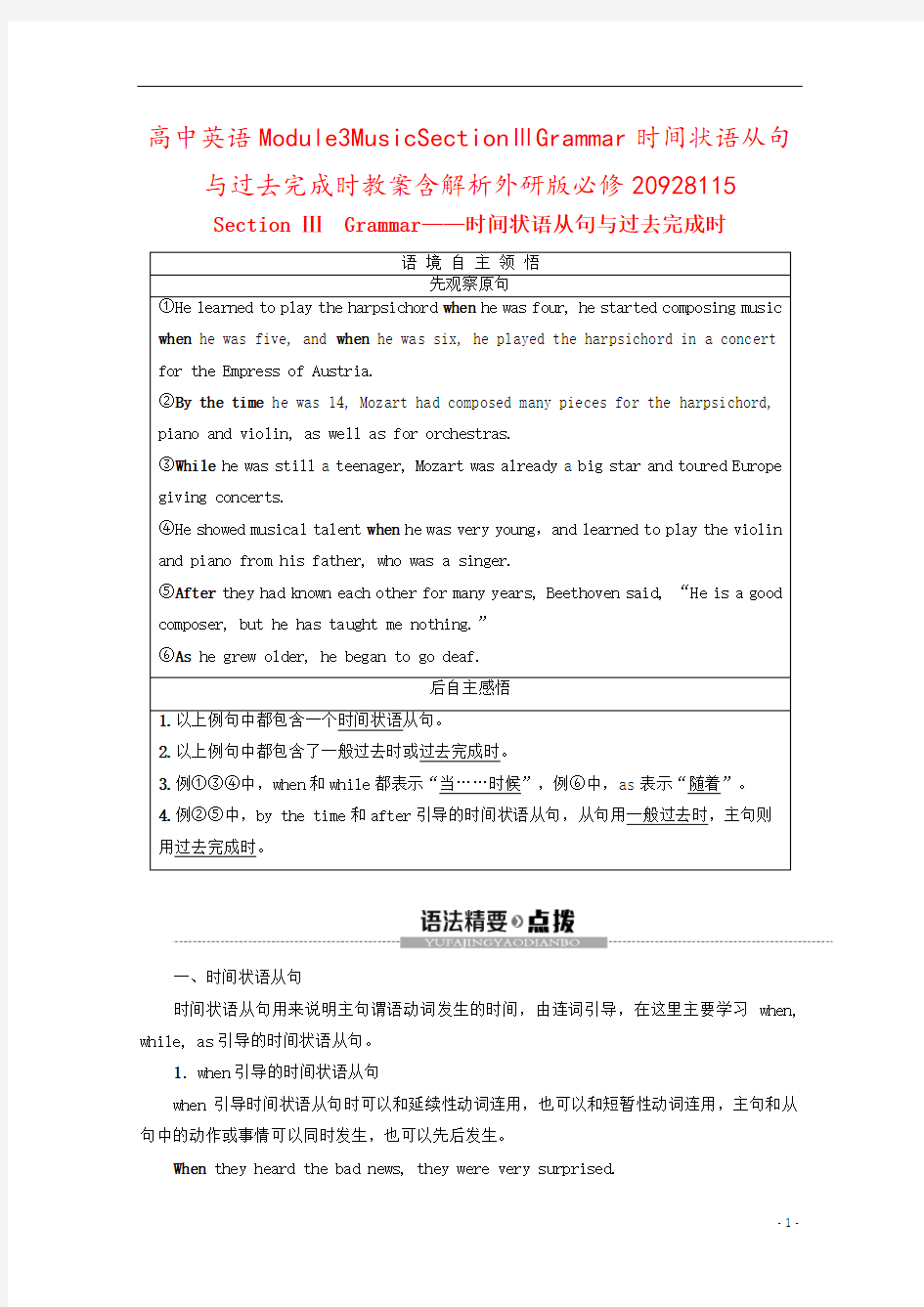

高中英语Module3MusicSectionⅢGrammar时间状语从句与过去完成时教案含解析外研版必修20928115
Section ⅢGrammar——时间状语从句与过去完成时
语境自主领悟
先观察原句
①He learned to play the harpsichord when he was four, he started composing music
when he was five, and when he was six, he played the harpsichord in a concert for the Empress of Austria.
②By the time he was 14, Mozart had composed many pieces for the harpsichord,
piano and violin, as well as for orchestras.
③While he was still a teenager, Mozart was already a big star and toured Europe
giving concerts.
④He showed musical talent when he was very young,and learned to play the violin
and piano from his father, who was a singer.
⑤After they had known each other for many years, Beethoven said, “He is a good
composer, but he has ta ught me nothing.”
⑥As he grew older, he began to go deaf.
后自主感悟
1.以上例句中都包含一个时间状语从句。
2.以上例句中都包含了一般过去时或过去完成时。
3.例①③④中,when和while都表示“当……时候”,例⑥中,as表示“随着”。
4.例②⑤中,by the time和after引导的时间状语从句,从句用一般过去时,主句则
用过去完成时。
一、时间状语从句
时间状语从句用来说明主句谓语动词发生的时间,由连词引导,在这里主要学习when, while, as引导的时间状语从句。
1.when引导的时间状语从句
when引导时间状语从句时可以和延续性动词连用,也可以和短暂性动词连用,主句和从句中的动作或事情可以同时发生,也可以先后发生。
When they heard the bad news, they were very surprised.
当他们听到那个坏消息时,他们非常惊讶。
When I was walking down the street, I saw some old friends.
当我沿着那条街走时,我看到了一些老朋友。
[名师点津]
when可用作并列连词,意为“这时,那时”,相当于and at this/that time。常用于:
(1)was/were doing sth. when...正在做……这时……
(2)be about to do sth./on the point of doing sth. when...正要做……这时……
(3)had(not) just done sth. when...刚做完……这时……
I was watching TV when someone knocked at the door.
我正在看电视,这时突然有人敲门。
I was about to go to bed when he called me up.
我正要上床睡觉的时候,他打电话来了。
2.while引导的时间状语从句
while引导时间状语从句时,意为“当……的时候”,从句的谓语动词必须是延续性动词。强调主句和从句的动作同时发生或相互对应。
While the child was playing with his toys, his parents were watching TV.
当那个孩子玩玩具时,他父母在看电视。
[名师点津]
(1)while引导让步状语从句,意为“虽然,尽管”,通常放在句首。
While he is young, he has been to many countries.
虽然他很年轻,但是他去过很多国家。
(2)while引导并列句,意为“而,然而”,通常位于句中。
I like playing football while my brother likes listening to music.
我喜欢踢足球而我哥哥喜欢听音乐。
3.as引导的时间状语从句
as引导时间状语从句时,常表示两个动作同时发生,常译作“一边……一边……;随着”。
As the average age of the population increases, there are more and more old people to care for.
随着人口平均年龄的增加,有越来越多的老人需要照顾。
He hurried home, looking behind as he went.
他匆忙回家去,一边走一边回头望。
[即时演练1] 用适当的连词填空
①It's good to know that the dogs will be well cared for when/while we're away.
②It was the middle of the night when my father woke me up and told me to watch
the football game.
③As you grow older, you'll know better and better about yourself.
二、过去完成时
1.过去完成时的用法
(1)表示在过去某个时间或动作之前就已经发生的动作,通常简称为“过去的过去”。句中常有by, by the end of等介词(短语)和by the time, before, when, until等引导的状语从句。
—Did you have difficulty finding Ann's house?
——你们找到安的家有困难吗?
—Not really. She had given us clear directions and we were able to find it easily.
——算不上难。她已经给了我们她家的具体的位置,我们能够容易地找到它。
By the end of 2017, he had collected more than a thousand foreign stamps.
到2017年底,他已经收集了1 000多枚外国邮票。
(2)过去完成时表示发生在过去某个动作或时刻之前的动作一直延续到过去的另一个时间,常与for, since等词连用。
I had been at the bus stop for 20 minutes when a bus finally came.
我在车站等了20分钟才来了辆公交车。
2.过去完成时在几个重点句型中的应用
(1)在no sooner...than, hardly...when句型中,主句用过去完成时,从句用一般过去时。意为“一……就;刚……就”。
I had hardly stepped into the classroom when the bell rang.
我一踏入教室的门,铃就响了。
No sooner had I reached home than it began to rain.
我刚到家就开始下雨了。
(2)在“It was the first/second/...time that...”句型中,that从句的谓语动词用过去完成时。
It was the first time that I had chatted online in English.
那是我第一次用英语在网上聊天。
(3)It was+一段时间+since 从句(从句用过去完成时)
It was at least three months since I had left Beijing.
我离开北京至少有3个月了。
(4)主句(过去完成时)+ by the time +表示过去的从句
By the time I got to the station, the train had already gone.
我到车站时,火车已经开走了。
(5)表示“意愿、打算”的动词如hope, mean, want, think, expect, plan, intend等的过去完成时表示“原本……(但事实上并没有……)”之意。
I had hoped to be back last night, but I didn't catch the train.
我本来希望昨晚回来的,但我没赶上火车。
3.过去完成时与一般过去时的区别
(1)一般过去时表示在过去的时间里发生的动作或存在的状态,而过去完成时表示在过去某一时刻或某个
动作之前已经完成的动作,即“过去的过去”,当强调过去某一动作发生在另一动作之前时,常用过去完成时态。
They had arrived at the railway station by ten o'clock yesterday.
昨天10点之前,他们已经到了火车站。
They arrived at the railway station at ten o'clock yesterday.
他们昨天10点到了火车站。
(2)一般过去时与过去完成时都可以和确定的表示过去的时间状语连用,但侧重点有所不同。
We had learned two English songs by the end of last week.
到上个星期为止,我们已经学了两首英文歌曲。
We learned two English songs last week.
上个星期我们学了两首英文歌曲。
[即时演练2] 单句语法填空
①She asked me whether I had returned(return) the books to the library, and I admitted that I hadn't.
②He is a professor of Shandong University.He stayed(stay)in America for 4 years.
③—Did you have to do much for the dinner party?
—Helen had finished(finish)everything by the time I got home.
Ⅰ.单句语法填空
1.It was the second time that he had rushed (rush) out of the classroom without permission.
2.I was very happy to see Jane again yesterday. We hadn't seen (not see) each other for six years.
3.We'll go to the country at the beginning of June when the summer harvest starts.
4.—Hurry up! Your classmates are waiting for you at the school gate.
—Oh! I thought they had gone(go) without me.
5.As she grew older she gained in confidence.
6.By the end of last term, more than 3,000 English words had been learnt (learn) by us.
7.It was really annoying; I couldn't get access to the data bank you had recommended (recommend).
8.He is doing some washing while I am doing my homework.
9.We had hoped (hope) that you would come, but you didn't.
10.Susan came to the party yesterday, but it was already half past eight when she turned up.
Ⅱ.单句改错
1.When I had lived in the countryside, I used to play in the woods.去掉had 2.—Why didn't Tom attend the meeting yesterday?
—He has gone to Beijing.has→had
3.I don't want to go to the cinema, for I had seen that film already.had→have 4.It was the worst hotel that I have ever stayed in. have→had
5. I planned to give you back your dictionary, but I was too busy then.planned 前加had
6.While time goes by, we will be older and older.While→As
7.He was doing his homework while his friend came in.while→when
8.Every time when he arrived home at the end of the day, we'd greet him at the door.去掉when
9.While I was quite u nwilling to say “Goodbye” to my father, but he had to leave for my hometown in the evening.去掉but
10.In fact, he even scared my classmates away during they came over to play or do homework with me.during→when